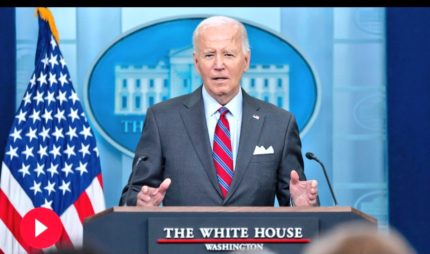President Joe Biden made headlines on Friday during a rare and impromptu appearance at a White House press briefing, where he addressed growing concerns over Israeli Prime Minister Benjamin Netanyahu’s actions regarding a potential Gaza ceasefire deal. When asked if Netanyahu was intentionally stalling negotiations to influence the upcoming US election, Biden stated, “Whether he’s trying to influence the election, I don’t know – but I’m not counting on that.”
Biden also took the opportunity to emphasize his administration’s unwavering support for Israel, highlighting his frustration with Netanyahu’s current stance. “No administration has helped Israel more than I have. None, none, none,” he stressed, directing pointed remarks at his Israeli counterpart. Biden’s comments come as some Democrats express concern that Netanyahu’s reluctance to negotiate may impact their party’s electoral prospects.
Democrats Fear Political Fallout Amid Middle East Tensions
Democratic leaders have voiced concerns that Prime Minister Netanyahu’s actions in the ongoing Gaza conflict could be politically motivated, aiming to weaken President Joe’s standing ahead of the November election. Senator Chris Murphy, a vocal critic of Netanyahu’s approach, told CNN earlier this week, “I don’t think you have to be a hopeless cynic to read some of Israel’s actions, some of Prime Minister Netanyahu’s actions, as connected to the American election.”
The failure to secure a ceasefire agreement or a deal for hostage release has weighed heavily on the Biden administration. Recent polls indicate that Biden’s approval rating, particularly among Arab-American voters, has sharply declined, largely due to his administration’s perceived unwavering support for Israel’s military actions. As the conflict drags on without a diplomatic resolution, Democratic strategists fear that this could have dire consequences for both Biden and Vice President Kamala Harris, who is now positioned as the Democratic candidate in the upcoming election.
Biden’s Diplomatic Push Fails to Yield Agreement
For months, President Joe has been pressing for a diplomatic breakthrough between Israel and Hamas, with hopes that a ceasefire agreement could provide a significant political boost ahead of the election. Despite indications that negotiations were making progress, with one US official claiming a deal was “90% complete,” Netanyahu has publicly refuted these assertions. The Israeli Prime Minister stated that “Hamas is not there with a deal. There’s not a deal in the making, unfortunately.”
This growing tension between Joe and Netanyahu, who have had a longstanding relationship dating back decades, contrasts starkly with Netanyahu’s previous warm rapport with former President Donald Trump. Biden’s increasing frustration with the Israeli leader underscores the strain in US-Israeli relations, as hopes for a resolution before the election appear to be fading. For Biden, securing a ceasefire agreement before November could have greatly bolstered his campaign and reinforced Democratic foreign policy successes, but the likelihood of that happening is becoming more remote.
Middle East Violence and Rising Oil Prices Add Pressure on president Joe
Beyond the political ramifications, escalating violence in the Middle East has posed additional challenges for the Biden administration. Israel has not only ramped up its operations in Gaza but also expanded military activities in southern Lebanon, and in response to an Iranian missile attack, Israeli forces have vowed retaliation. These developments have kept the region in turmoil, further complicating Biden’s efforts to maintain stability.
At Friday’s press briefing, Biden also addressed concerns about the potential for Israeli strikes on Iranian oil fields, a move that could further destabilize global oil markets. “The Israelis have not concluded what they are going to do in terms of a strike,” he said, suggesting they should consider alternatives. Earlier comments from Biden regarding possible Israeli strikes on Iranian oil infrastructure had already caused oil prices to spike, intensifying global economic anxieties as the conflict drags on.
As the Biden administration navigates these complex international challenges, the president’s ability to secure a diplomatic resolution in the Middle East—or manage its fallout—could have significant implications for both his legacy and his party’s future in the upcoming election.














